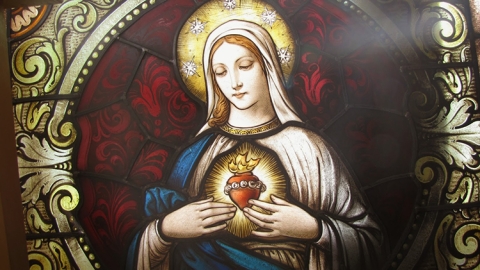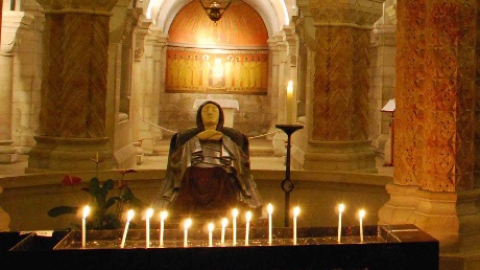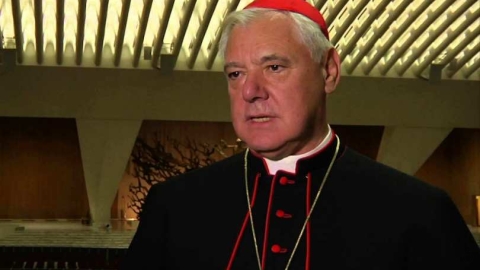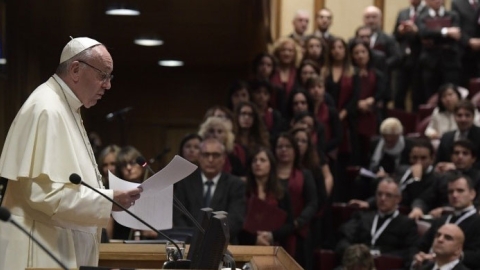Audiolecture of St. Joan of Arc - The Inspired Generalship of the Peasant of Lorraine

Listen to a story of courage, sanctity, and acceptance of Divine Providence in this Audiolecture by Christopher Check, available at Angelus Press.
England and France had long been fighting over the domination of much of the French countryside by the time that St. Joan of Arc was born to a devout peasant family in the northeastern part of France. Despite her humble beginnings, this young girl was destined to change the course of history, and ultimately act to prevent France from falling into Henry VIII's schism less than 100 years after her death.
This magnificent recording by Mr. Check will bring to life this fascinating, but often complex story of the Hundred Years War, the checkered political map of France, the visions and sanctity of St. Joan, and most importantly, a deep understanding of the effect of Providence upon the lives of men. This is one story you will not want to miss!
Also, enjoy a free preview of the lecture on the Angelus Press website!
About the Lecturer
Mr. Christopher Check - President of Catholic Answers
A graduate of Rice University, for nearly two decades he served as vice president of The Rockford Institute. Before that he served for seven years as a field artillery officer in the Marine Corps, attaining the grade of captain. He lectures on Church and military history. He and his wife, Jacqueline, have four sons. He has 7 other lectures currently available on Angelus Press.

St. Joan of Arc
How nice it sounds, "St. Joan of Arc." But through all the history of sanctity you will find this same quality persisting—the quality of realizing that what we see and touch and feel are transitory things and unreal, and that the solid and substantial things, are the things that appear not, the world we only grasp by faith.
And I am insisting on that particular quality this morning because I think it is one that stands out with quite extraordinary clearness in St. Joan's life: she did really live for a promise, and we know that the promise came true, but she did not—not in this life. She was very young, you know. Did you realize that she was less than twenty years old when she was burnt at the stake? It is not true that she dressed as a man: she dressed as a boy. When she was only thirteen years old, at the age when other boys and girls were fidgeting and playing the fool during Mass, as people did in those days, she could hardly go out of doors without hearing the voices of saints and angels talking to her. And those voices dominated her life; they echoed so loudly in her ears that all the world's noises were drowned for her. People said: "It is very silly of a small girl like you to think she can go and see the King"—she did not hear them. And the King, as you well know, disguised himself and hid among his courtiers, and she went straight up to him: "But I am not the King," he said; "that is the King over there." "Oh, yes, you are; I have come to raise the siege of Orleans and crown you King at Rheims." It was no good; the voices had told her about it. And I suppose when she had been appointed Chief of the Army, the General Staff would always be raising military difficulties about re-entrant angles and being enfiladed by arquebus-fire, and so on, but it did not make a bit of difference to her, she always did what the voices told her—they were close to her ear, you see, and the criticisms of the General Staff were only a distant echo. She went out, not knowing whither she went.
And of course she had disappointments. After the first few victories, after the crowning of the King, the people she had come to save contented themselves with a partial conquest, and hung about making treaties and demobilizing troops. And truly, if she had been mindful of that from whence she came out, she had doubtless time to return; she could have gone back to Domremy and rested on her laurels. But the ingratitude and apathy of the court affected her no more than its honours had done; she simply went on obeying the voice. And the French lords played her false, and she was taken prisoner. But she endured, as seeing him who is invisible.
And then came the hardest time of all. I do not think she minded being in prison; I do not think she minded the threat of execution; that was not why she tried to escape. No, it was simply that it seemed quite obvious to her she was to deliver France—the voices had told her so—and France was not yet delivered. And so she went to the stake, her hopes still unfulfilled, but never doubting for an instant that the voices were true. Five years later the King entered Paris; twenty-two years later, England had no possessions left on French soil. She believed that he was faithful who had promised, not having received the promises, but beholding them afar off and saluting them. She could not foresee that her unjust condemnation would be reversed, point by point, twenty-five years after her death: she could not foresee that, nearly five hundred years after her death, France, once more liberated, would receive the tiding of her canonization by the tribunal to which, in life, she never ceased to appeal, the tribunal of the Holy See. But she believed that he was faithful who had promised.
That, then, is her great witness, as is the witness of all the saints: that is her capital contribution to our Christian hope—we know, because the saints have told us so, that it is the things of this world that are shams and shadows, and the real things and the solid things are the things we cannot see. Our Saviour Christ has ascended up into heaven, and a cloud received Him from our sight, but we are not therefore to think of the spiritual world as something far removed from us, only to be reached by a supreme effort of thought. On the contrary, the spiritual world is all about us: the voices are still there, only St. Joan could hear them and we cannot. I wonder whose fault that is? Blessed are the pure in heart, for they shall see God.
From the May, 1983 issue of The Angelus





